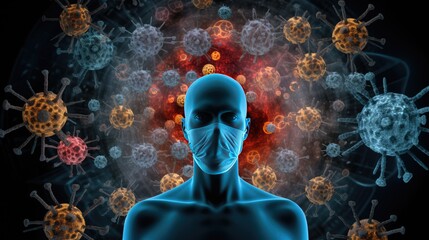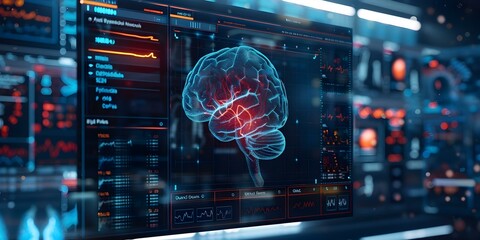Introduction to Early Disease Detection
Understanding the Importance
Early disease detection is critical for saving lives and improving health outcomes. Traditional diagnostic methods often rely on symptoms, which may not manifest until a disease has progressed significantly, making treatment less effective and more challenging.
Early Disease Detection Saves Lives
Detecting diseases at an early stage allows for timely intervention and treatment, leading to better prognosis and improved patient outcomes. However, traditional diagnostic approaches have limitations, including false negatives, delays in diagnosis, and reliance on subjective interpretation.
Role of AI in Early Disease Detection
Harnessing the Power of AI
Artificial intelligence (AI) has emerged as a powerful tool in early disease detection, leveraging advanced algorithms and data analytics to analyze complex medical data and identify patterns indicative of disease.
Machine Learning Algorithms
AI-driven machine learning algorithms can analyze vast amounts of medical data, including patient records, imaging studies, and genetic information, to identify patterns and trends that may not be apparent to human practitioners. These algorithms can learn from data and improve over time, enhancing diagnostic accuracy and efficiency.
Big Data Analysis
AI enables the analysis of big data sets, including electronic health records, medical imaging archives, and genomic databases, to uncover insights and correlations that can aid in disease detection and risk prediction. By processing and interpreting large volumes of data, AI algorithms can identify subtle patterns and markers associated with specific diseases.

Applications of AI in Healthcare
Transforming Healthcare Practices
AI is revolutionizing healthcare practices by enabling more accurate, efficient, and personalized diagnosis and treatment strategies.
Medical Imaging Analysis
AI-powered medical imaging analysis systems can assist radiologists in interpreting imaging studies, such as X-rays, MRIs, and CT scans, by highlighting abnormalities and flagging suspicious findings for further review. This improves diagnostic accuracy and reduces interpretation errors, leading to more timely and effective treatment.
Predictive Analytics
AI-driven predictive analytics models can forecast disease risk and progression based on individual patient data, lifestyle factors, and genetic predisposition. By identifying high-risk individuals early, healthcare providers can implement preventive measures and interventions to mitigate disease development and progression.
Advantages of AI in Disease Detection
Benefits of AI-driven Diagnosis
AI offers several advantages over traditional diagnostic approaches, including:
Accuracy and Efficiency: AI algorithms can analyze medical data with a high degree of accuracy and efficiency, reducing diagnostic errors and improving patient outcomes.
Early Warning Systems: AI-powered early warning systems can identify subtle changes in patient health indicators and alert healthcare providers to potential disease onset or progression, enabling timely intervention and treatment.

Challenges and Limitations
Addressing Challenges
While AI holds promise in early disease detection, several challenges and limitations must be addressed to realize its full potential in clinical practice.
Data Privacy Concerns
The use of patient data for AI-driven analysis raises privacy concerns regarding data security, confidentiality, and informed consent. Healthcare organizations must implement robust data protection measures and adhere to strict privacy regulations to safeguard patient information.
Integration with Existing Systems
Integrating AI-driven diagnostic tools and algorithms into existing healthcare systems and workflows poses technical and logistical challenges. Healthcare providers must ensure seamless integration and interoperability to maximize the utility and adoption of AI technologies in clinical practice.
Future Trends and Developments
Emerging Technologies
The future of AI in early disease detection holds exciting possibilities, with emerging technologies poised to further enhance diagnostic capabilities and personalized medicine approaches.
Personalized Medicine
AI-driven personalized medicine approaches aim to tailor diagnosis and treatment strategies to individual patient characteristics, preferences, and genetic profiles. By considering patient-specific factors, such as genetic predisposition, lifestyle, and environmental influences, personalized medicine can optimize treatment outcomes and improve patient satisfaction.
Wearable Devices
Advancements in wearable technology, such as smartwatches, fitness trackers, and medical sensors, are enabling continuous monitoring of vital signs, biomarkers, and health metrics in real-time. AI algorithms can analyze wearable data streams to detect early signs of disease and track disease progression, empowering individuals to take proactive steps towards better health.
Case Studies and Success Stories
Real-world Applications
Several real-world applications demonstrate the effectiveness of AI in early disease detection across various medical specialties.
Cancer Detection with AI
AI-powered cancer detection algorithms can analyze medical imaging studies, such as mammograms and CT scans, to detect early signs of cancerous lesions and tumors. By identifying suspicious findings that may be missed by human practitioners, AI can facilitate earlier diagnosis and treatment initiation, improving cancer outcomes and survival rates.
Cardiovascular Risk Assessment
AI-driven predictive analytics models can assess cardiovascular risk factors and predict the likelihood of heart disease development in individuals. By analyzing patient data, such as blood pressure, cholesterol levels, and lifestyle habits, AI algorithms can stratify patients into risk categories and recommend personalized preventive interventions, such as lifestyle modifications and medication therapy, to reduce cardiovascular risk and improve heart health.
Ethical Considerations
Ensuring Ethical AI Practices
As AI technologies continue to advance in healthcare, it is essential to uphold ethical principles and practices to mitigate potential risks and ensure patient safety and well-being.
Bias and Fairness
AI algorithms are susceptible to biases inherent in training data, which can lead to disparities in diagnosis and treatment outcomes across demographic groups. Healthcare providers must address bias and fairness issues in AI-driven diagnostic models to ensure equitable access to healthcare services and avoid perpetuating existing disparities in patient care.
Informed Consent
Patients must be adequately informed about the use of AI-driven diagnostic tools and algorithms in their healthcare and provide informed consent for data collection, analysis, and treatment recommendations. Transparent communication and shared decision-making between patients and healthcare providers are essential to uphold patient rights and autonomy in the use of AI technologies in healthcare.

Conclusion
In conclusion, AI is revolutionizing early disease detection by leveraging advanced algorithms and data analytics to analyze complex medical data and identify patterns indicative of disease. From medical imaging analysis to predictive analytics and personalized medicine, AI-driven diagnostic tools and algorithms offer numerous advantages over traditional diagnostic approaches, including accuracy, efficiency, and early detection capabilities. However, challenges such as data privacy concerns and integration with existing healthcare systems must be addressed to realize the full potential of AI in clinical practice. As emerging technologies continue to shape the future of healthcare, ethical considerations, such as bias and informed consent, are paramount to ensure the responsible and equitable use of AI in early disease detection.

FAQs (Frequently Asked Questions)
- How does AI contribute to early disease detection? AI utilizes advanced algorithms and data analytics to analyze medical data and identify patterns indicative of disease, enabling early detection and intervention for better patient outcomes.
- What are some advantages of AI-driven diagnosis? AI-driven diagnosis offers advantages such as accuracy, efficiency, and early warning capabilities, leading to improved patient outcomes and treatment effectiveness.
- What challenges exist in the integration of AI in healthcare? Challenges in the integration of AI in healthcare include data privacy concerns, bias in algorithms, and interoperability with existing healthcare systems and workflows.
- Can AI be used for personalized medicine? Yes, AI-driven personalized medicine approaches tailor diagnosis and treatment strategies to individual patient characteristics, preferences, and genetic profiles, optimizing treatment outcomes and patient satisfaction.
- How can ethical considerations be addressed in AI-driven healthcare? Ethical considerations in AI-driven healthcare, such as bias and informed consent, can be addressed through transparent communication, responsible data practices, and adherence to ethical guidelines and regulations.





